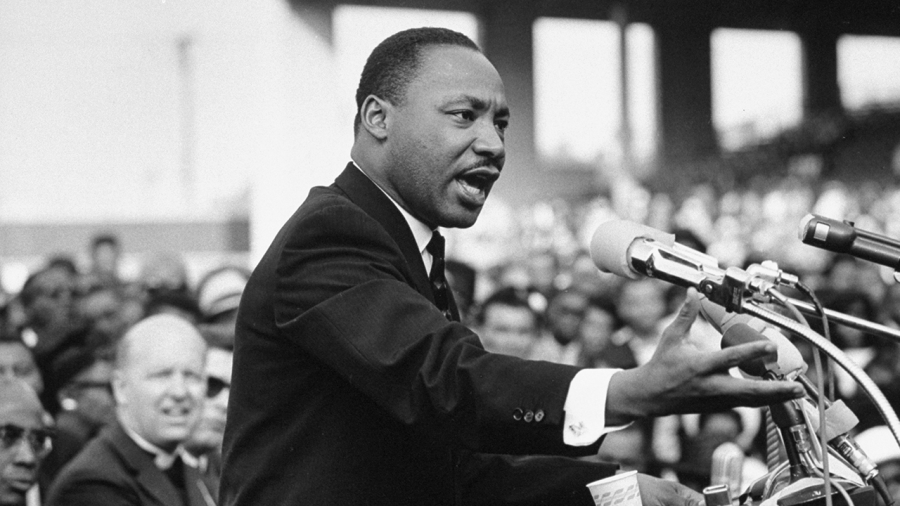The Legacy of Dr. Martin Luther King Jr.
January 18, 2021
On Wednesday, Jan. 13, NDP reflected on the life and work of Dr. Martin Luther King, Jr., with a prayer service followed by a group discussion. Martin Luther King Jr. Day reminds us of the history we must acknowledge and the injustices we are called to fight today. King’s work helped change America for the better, and his perseverance and dedication can inspire us today.
Martin Luther King, Jr., was born in 1929 in Atlanta, Georgia. After graduating from high school at age fifteen, he studied at Morehouse College and Crozer Theological Seminary. King was elected as president of his predominately white class and earned a bachelor’s degree before continuing his studies at Boston University and earning his doctorate in 1955.
King had always been a strong advocate for civil rights and joined the National Association for the Advancement of Colored People (NAACP) during the early 1950s. In December of 1955, he led the first large-scale nonviolent protest in the U.S., a bus boycott that lasted 382 days and led to the Supreme Court declaring segregation laws on buses unconstitutional. Over the course of this boycott, King was faced with arrest, home-bombing, and abuse, but he emerged as a strong leader.
In 1957, King was elected as the president of the Southern Christian Leadership Conference, which worked to give leadership and organization to the civil rights movement. After his election, King traveled for 11 years, speaking thousands of times at protests and demonstrations. One of these protests, held in Birmingham, Alabama, brought attention from around the world to the movement and inspired his “Letter from a Birmingham Jail,” which is considered to be one of the most important documents from the civil rights era. King also planned voter registration drives for black people and organized a 250,000-person march on Washington, during which he delivered his famous “I Have a Dream” address. Over these 11 years, King was harshly criticized, physically assaulted, and arrested over twenty times, but he never stopped fighting for justice.
At age thirty-five, King received the Nobel Peace Prize, becoming the youngest man to have ever done so. He put the prize money of over $50,000 into aiding the civil rights movement. King was also awarded five honorary degrees and named Man of the Year in 1963 by Time magazine. His unwavering dedication to equality and justice established him as a leader within the civil rights movement, throughout America, and all over the world.
On April 4, 1968, King came to Memphis, Tennessee, to lead a protest march with striking workers. He was fatally shot that evening standing on his balcony. Escaped prisoner James Earl Ray was charged with the crime and pled guilty in court, but many believe that King’s assassination resulted from a conspiracy involving the U.S. government and local police. For years, King and other important figures of the civil rights movement were investigated and harassed by the FBI. The FBI had placed bugs in King’s hotel rooms and directed media campaigns to tarnish his image (which continued after his death), and allegedly sent anonymous letters to King encouraging him to commit suicide. This history has led King’s family and many others to suspect conspiracy in his assassination.
Even with his life cut short, Dr. Martin Luther King, Jr., did an incredible amount of work to further the civil rights movement and change America for the better. King’s courage, commitment, resilience, and peacekeeping can be looked to as an example today as we continue to face inequality and injustice in America and around the world.
Sources:
“Martin Luther King, Jr. Part 1 of 2.” FBI, FBI, 6 Dec. 2010, vault.fbi.gov/Martin%20Luther%20King%2C%20Jr./Martin%20Luther%20King%2C%20Jr.%20Part%201%20of%202/view.
News, FOX 17. “Events to Honor Martin Luther King Jr. in West Michigan.” WXMI, WXMI, 20 Jan. 2020, www.fox17online.com/news/local-news/grand-rapids/events-to-honor-martin-luther-king-jr-in-west-michigan.
“The Nobel Peace Prize 1964.” Edited by Frederick W Haberman, NobelPrize.org, Elsevier, 1972, www.nobelprize.org/prizes/peace/1964/king/biographical/.



Tom Peri • Jan 19, 2021 at 7:51 am
Well done Caroline!